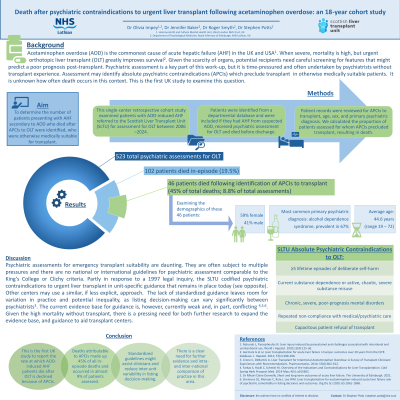Transplant Psychiatry and C-L Subspecialties
(210) Death after Psychiatric Contra-Indications to Urgent Liver Transplant following Paracetamol Overdose: an 18-year Cohort Study


Olivia R. E Impey, MBChB
Psychiatry Core Trainee
West London NHS Trust
London, England, United Kingdom
Stephen G. Potts, FRCPsych FRCPE FRCSEd
Consultnat in Transplant Psychiatry
Royal Informary of Edinburgh
Edinburgh, Scotland, United Kingdom
Roger S. Smyth, MBChB FRCPsych LLM
Consultant Psychiatrist
NHS Lothian
Edinburgh, Scotland, United Kingdom- JB
Jennifer Baker, MBChB
Foundation Year 1
NHS
Edinburgh, Scotland, United Kingdom
Presenting Author(s)
Co-Author(s)
BACKGROUND/SIGNIFICANCE
Paracetamol overdose (POD) is the most common cause of acute severe liver injury (ASLI) in the UK (Kahn, 2010). Without urgent orthotopic liver transplant (OLT), mortality is high. Psychiatric assessment is a crucial part of the work-up. It is time-pressured and often undertaken by liaison psychiatrists without transplant experience. In some cases, assessment identifies absolute psychiatric contraindications (APCIs) precluding transplant in an otherwise medically suitable patient. This study aimed to ascertain how common this is.
METHODS
This is a single-centre retrospective cohort study for the period 2006-2024. We examined in-episode deaths of patients with ASLI secondary to suspected POD who were referred to the Scottish Liver Transplant Unit (SLTU) for assessment for OLT. We determined the number of patients otherwise medically suitable for OLT, who died after APCIs were identified. We also explored demographics and psychiatric diagnoses.
Patients were identified from a departmental database. They were included if they had ASLI from suspected POD; received a psychiatric assessment for OLT; and died before discharge. We reviewed patient records for APCIs to transplant, as well as age, sex, and primary psychiatric diagnosis. We calculated the proportion of patients assessed for whom APCIs alone precluded transplant, resulting in death. Ethical approval was not required.
RESULTS
Among the 523 patients undergoing assessment for OLT, there were 102 in-episode deaths (19.5%). APCIs were identified in 46 patients who were otherwise medically suitable for transplant and later died. This figure represents 8.8% of those undergoing assessment and 45% of those who died. Of this subgroup, 27 (59%) were female and the average age was 44.6 years (range 19-72). The most common primary psychiatric diagnosis was Alcohol Dependence Syndrome, found in 67% (n=31).
DISCUSSION
Previous research in this area is sparse. One study shows that psychiatric co-morbidity in patients who receive a liver transplant does not impact short-term outcomes (Simmons, 2019). Another study reports that death from self-harm after OLT for POD-induced ASLI is infrequent (Cooper, 2009), although there is still significant medical morbidity and mortality (Khan, 2010). This is the first UK study to report a rate of transplant declines on psychiatric grounds.
CONCLUSION/IMPLICATIONS
Nearly 9% of patients with ASLI secondary to POD died after APCIs precluded OLT. Though low enough to be reassuring, this figure still high enough to require further research, continued training and close clinical support for assessors. International evidence-based guidelines would aid assessors, optimise patient survival and gift utilisation and minimise variation between units.
REFERENCES
Kahn LR, Oniscu GC, Powell JJ. Long-term outcomes following liver transplantation for paracetamol overdose. Transpl Int. 2010; 23(5):524-9.
Cooper SC, Aldridge RC, Shah T, Webb K, Nightingale P, Paris S et al. Outcomes of liver transplantation for paracetamol (acetaminophen)-induced hepatic failure. Liver transpl. 2009;15(10):1351-1357.
Simmons OL, Meinzer C, Rule J, Lee WM. Liver Transplantation for Acetominophen-Induced Acute Liver Failure: Role of Psychiatric Comorbidity in Listing Decisions and Outcomes. J Dig Dis Sci. 2019; 65:1861-1868.
Presentation Eligibility: Abstract submitted to UK Faculty of Liaison Psychiatry Annual Conference, London, May 15-17 2024. Currently awaiting acceptance decision.
We highlight the need for international comparison between transplant units regarding practices of psychiatric assessments, in order to advance practice and training.
Diversity, Equity, and Inclusion: Urgent liver transplantation after paracetamol overdose is a massive resource allocation to patients whose need arises from self-harm acts. Such patients may be seen as undeserving of treatment on this scale and there may be concerns about future compliance with post-transplant regimens. This presents a risk of unjust discrimination against these patients. This study attempts to address the question of how such patients are assessed and against what criteria.
The authors are drawn from a broad range of career stages. The first and second authors are young female doctors passionate about championing women in medicine and research.

